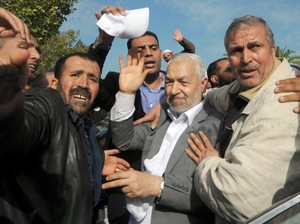The leader of a Tunisian Islamist party that was long outlawed by authorities has returned to his homeland after two decades in exile.

His return from London follows the ouster of President Zine El Abidine Ben Ali, who was forced from power by violent protests this month after 23 years in power. Ennahdha was branded an Islamic terrorist group by Ben Ali but is considered moderate by scholars.
Ghanouchi has said he is not interested in running for president or other posts in upcoming elections, which are set to take place within six months. His party has moved quickly to carve out a place in the political scene, taking part in demonstrations and meeting with the prime minister.
Though their own revolution is far from finished, Tunisians are proud of what they have sparked in the Arab world.
Life is slowly returning to normal in Tunis. Cafes are once again crowded with coffee drinkers soaking up the winter sun. And stores have reopened.
Enda Bassouni opened the shutters on her perfume boutique. She says sales are still way below normal, but life is better. She’s says she’s been watching what’s going on in Egypt and is worried about all the deaths and violence. But she’s pulling for the people in Egypt who are seeking to oust President Hosni Mubarak.
“There are a lot of common points between Tunisia and Egypt and I want that government to leave,” Bassouni says. “It’s worse than a monarchy. He should prepare to flee to Saudi Arabia like our president.”
Ben Ali ruled Tunisia with an iron fist for 23 years, until the people rose up and overthrew him. Their anger at corruption, repression and poverty spread on the internet, sparking the revolt. And the Tunisian example inspired the Egyptians.
Mohamed Khelimi, who spent many years in jail under Tunisian autocrat Ben Ali, says it is marvelous to see what’s going on in Egypt.
“I think that we have [exported] a model of revolution, a clean and pacifist revolution to all the dictator. This is very nice for all Arab countries. I feel good, very ,very nice. I cry victory!”
Inside a smoky restaurant everyone is talking about events in Egypt. And how it all started in Tunisia.
One man says Egypt is just phase two of the Tunisian revolution and there will be more to come. Then a waiter breaks in, saying, “”Doesn’t [Mubarak] think 30 years is enough? It’s a catastrophe! And now he wants his son to take over after him?!”
People here have had it with Arab strongmen. Rhoudani Whaleed, 35, who describes himself simply as a father, sums up the sentiment.
“Humanity is conquering technology and here we are struggling for basic human rights and respect,” he says. “We were all but forgotten. But now a giant tsunami has just hit the Arab world.”
That fabulous tsunami, says Whaleed, came from right here. And today he says everyone is proud to be Tunisian.”

Leave a Reply
You must be logged in to post a comment.